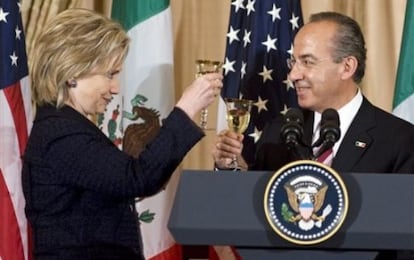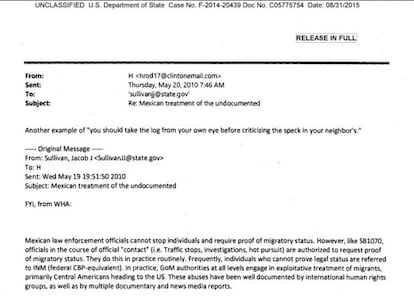Hillary Clinton email on immigration likely to irritate Mexican government
Correspondence reveals politician’s view on criticism of controversial Arizona law

The coincidence is embarrassing. The same day that former Mexican President Felipe Calderón denounced Arizona’s law against illegal immigration in a speech in Washington, then-Secretary of State Hillary Clinton wrote that such criticism was hypocritical given the cases of abuse of undocumented migrants in Mexico. That’s according to a newly declassified email published by the State Department on Monday night, dating from Clinton’s first two years as secretary of state.
“Another example of ‘you should take the log from your own eye before criticizing the speck in your neighbor’s’,” Clinton wrote on May 20, 2010 at 7.46am Washington time, in response to an email she received the day before from Jacob Sullivan, one of her closest advisors. That day, on May 19, she held a luncheon in honor of President Calderón at the State Department.
Another example of you should take the log from your own eye before criticizing the speck in your neighbor’s,” Clinton wrote in 2010
In an email titled “Mexican treatment of the undocumented,” Sullivan, Director of Policy Planning at the US Department of State, shares information he allegedly received from Western Hemisphere Affairs. “FYI, from WHA,” he explains in the note.
In his message, Sullivan compares the abuse by and authority given to Mexican officials in their interactions with undocumented immigrants with Arizona’s immigration law, SB1070, which allows police to detain any individual suspected of being in the country illegally. The law passed in April 2010 despite harsh criticism from the White House.
“Mexican law enforcement officials cannot stop individuals and require proof of migratory status. However, like SB1070, officials in the course of official ‘contact’ (i.e. Traffic stops, investigations, hot pursuit) are authorized to request proof of migratory status. They do this in practice routinely,” he writes.

“Frequently, individuals who cannot prove legal status are referred to INM (federal CBP-equivalent) [presumably the initials of the National Migration Institute]. In practice, GoM [presumably the acronym for the Government of Mexico] authorities at all levels engage in exploitative treatment of migrants, primarily Central Americans heading to the US. These abuses have been well documented by international human rights groups, as well as by multiple documentary and news media reports.”
In 2014, the Inter-American Commission on Human Rights (IACHR) published one of the most thorough reports on this issue, saying it had found “concrete, consistent indications that many of the serious violations of migrants’ rights occur in a context of abuse of authority by State agents who belong to the National Institute of Migration or the various police forces.”
The same day that Clinton answered that email, President Calderón gave a speech before both houses of Congress to denounce the United States’ failure to meet its responsibility in solving the drug problem. He also criticized Arizona’s law, saying it “not only ignores a reality that cannot be erased by decree but also introduces the terrible idea of using racial discrimination.”
In September 2010, she said that Mexico is “looking more and more like Colombia looked 20 years ago”
The day before, when Sullivan wrote that email to Clinton, the Mexican president had expressed himself in a similar way in a meeting with President Barack Obama at the White House.
In June 2012, the United States Supreme Court struck down most of the provisions in the Arizona law except the section allowing police to check the immigration status of those suspected of being illegal immigrants.
This is not the first time that comments made by Clinton might irritate the Mexican government. In September 2010, four months after she wrote that private email to Sullivan, she said that, given the increasing violence, Mexico is “looking more and more like Colombia looked 20 years ago, where the narco-traffickers control certain parts of the country.” These comments infuriated the neighbor country.
The email about Mexico is one of more than 4,000 such documents the State Department released on Monday in compliance with a court order. The lawsuit over the former secretary’s emails was brought by Jason Leopold, a reporter for Vice News. The controversy began in March after it was revealed that, as secretary of state, Clinton had used a private email account for her correspondence. While she claimed that no classified information was sent or received via that account, 125 emails have since been designated classified by the US State Department.
English version by Dyane Jean Francois.
Tu suscripción se está usando en otro dispositivo
¿Quieres añadir otro usuario a tu suscripción?
Si continúas leyendo en este dispositivo, no se podrá leer en el otro.
FlechaTu suscripción se está usando en otro dispositivo y solo puedes acceder a EL PAÍS desde un dispositivo a la vez.
Si quieres compartir tu cuenta, cambia tu suscripción a la modalidad Premium, así podrás añadir otro usuario. Cada uno accederá con su propia cuenta de email, lo que os permitirá personalizar vuestra experiencia en EL PAÍS.
¿Tienes una suscripción de empresa? Accede aquí para contratar más cuentas.
En el caso de no saber quién está usando tu cuenta, te recomendamos cambiar tu contraseña aquí.
Si decides continuar compartiendo tu cuenta, este mensaje se mostrará en tu dispositivo y en el de la otra persona que está usando tu cuenta de forma indefinida, afectando a tu experiencia de lectura. Puedes consultar aquí los términos y condiciones de la suscripción digital.
Archived In
- Caso emails Hillary Clinton
- Filtración documentos
- Partido Demócrata EE UU
- Ciberespionaje
- FBI
- Hillary Clinton
- Seguridad nacional
- Delitos informáticos
- Policía
- Espionaje
- Privacidad internet
- Partidos políticos
- Defensa
- Fuerzas seguridad
- Seguridad internet
- Internet
- Delitos
- Medios comunicación
- Telecomunicaciones
- Justicia
- Política
- Comunicaciones
- Comunicación








































